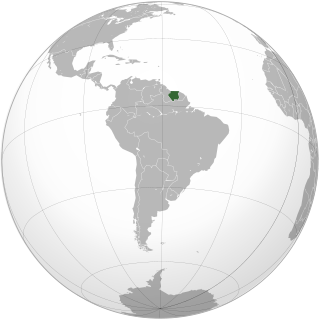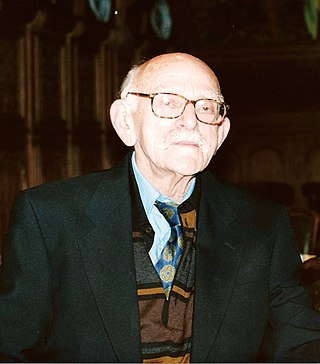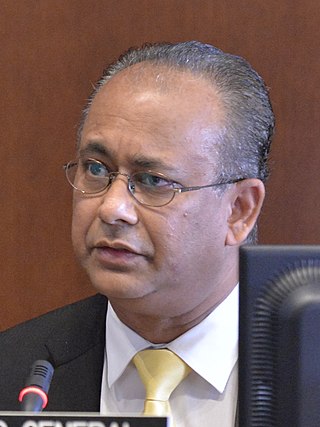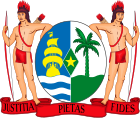
Suriname, officially the Republic of Suriname, is a country in northern South America, sometimes considered part of the Caribbean and the West Indies.

Politics of Suriname take place in a framework of a representative democratic assembly-independent republic, whereby the president of Suriname is the head of state and head of government, and of a pluriform multi-party system. Executive power is exercised by the government. The executive power is dependent on the Parliament in theory. Legislative power is vested in both the government and the National Assembly. The judiciary is independent of the executive and the legislature.

The president of the Republic of Suriname is, in accordance with the Constitution of 1987, the head of state and head of government of Suriname, and commander-in-chief of the Suriname National Army (SNL). The president also appoints a cabinet.
The December murders were the murders on 7, 8, and 9 December 1982, of fifteen prominent young Surinamese men who had criticized the military dictatorship then ruling Suriname. Thirteen of these men were arrested on December 7 between 2 am and 5 am while sleeping in their homes. The other two were Surendre Rambocus and Jiwansingh Sheombar who were already imprisoned for attempting a countercoup in March 1982. Soldiers of Dési Bouterse took them to Fort Zeelandia, where they were heard as "suspects in a trial" by Bouterse and other sergeants in a self-appointed court. After these "hearings" they were tortured and shot dead. The circumstances remain unclear. On 10 December 1982, Bouterse claimed on national television that all of the detainees had been shot dead "in an attempt to flee".

Lesbian, gay, bisexual, and transgender (LGBT) people in Suriname may face legal challenges not experienced by non-LGBT residents. Both male and female expressions of same-sex sexual activity are legal in Suriname. Since 2015, hate speech and discrimination in employment and the provision of goods and services on the basis of sexual orientation has been banned in the country. Same-sex marriage and civil unions are not recognised by law. Nevertheless, Suriname is legally bound to the January 2018 Inter-American Court of Human Rights ruling, which held that same-sex marriage is a human right protected by the American Convention on Human Rights.

The vice president of Suriname is the second-highest political position in Suriname, after the president. The president and the vice president are elected by the National Assembly for five-year terms.

Jules Sedney was a Surinamese politician, and Prime Minister of Suriname from 20 November 1969 to 24 December 1973. In 1980, he became governor of the Central Bank of Suriname, but had to flee the country in 1983 after a dispute with Dési Bouterse. Sedney returned to Suriname in 1989.

Ronnie Brunswijk is a Surinamese politician, businessman, former rebel leader, footballer and convicted drug trafficker, who is serving as the current Vice President of Suriname.

Chandrikapersad "Chan" Santokhi is a Surinamese politician and former police officer who is the 9th president of Suriname, since 2020. After winning the 2020 elections, Santokhi was the sole nominee for president of Suriname. On 13 July, Santokhi was elected president by acclamation in an uncontested election. He was inaugurated on 16 July.

Julius Caesar de Miranda was a Surinamese jurist and politician. De Miranda was the first prime minister of Suriname.

The Constitutional Court of Sint Maarten is a court of Sint Maarten. As a constitutional court it evaluates the constitutionality of the provisions of legislation which is approved by the Estates of Sint Maarten and signed into law, but which has not entered into force. Procedures by the court may be initiated only by the ombudsman of Sint Maarten. As of July 2016, the court has decided two cases. Sint Maarten is the only country in the Kingdom of the Netherlands with a constitutional court.

Hugo Pos was a Surinamese judge, writer, and poet.

Suriname competed at the 2019 Pan American Games in Lima, Peru from July 26 to August 11, 2019.

General elections were held in Suriname on 25 May 2020. The elections occurred concurrently with an economic crisis in Suriname, as well as the COVID-19 crisis.
The COVID-19 pandemic in Suriname was caused by Severe acute respiratory syndrome coronavirus 2. The virus was confirmed to have reached Suriname on 13 March 2020. The case was a person who travelled from the Netherlands the previous week. On 3 April 2020, one person died. On 3 May 2020, all nine cases had recovered. On 18 May, an eleventh case was identified.

Danielle Veira is a Surinamese Army colonel and public official.

Marinus Bee is a Surinamese politician, Chairman of the National Assembly of Suriname, and sports manager. As sports manager, he was chairman of the Albina Sports Foundation for ten years, and since 2014 chairman of S.V. Papatam. Bee has been elected to the National Assembly for the General Liberation and Development Party (ABOP) since 2010 for the Marowijne District.

Albert Ramchand Ramdin is a Surinamese diplomat serving as Minister of Foreign Affairs in the Santokhi cabinet since 16 July 2020. He is a member of the Progressive Reform Party (VHP). He was a diplomat until 2015 and was, among other roles, Assistant Secretary-General of the Organization of American States (OAS).

Karin B. Refos is a Surinamese former model, entrepreneur, and public speaker on child welfare and women's rights. She founded the brand consultancy STAS International.
The Suriname India Chamber of Commerce and Industry (SICCI) is an international, semi-governmental chamber of commerce that is aiming at strengthening the economic ties between Suriname and India, and for the long term between the Caribbean region and India.


















